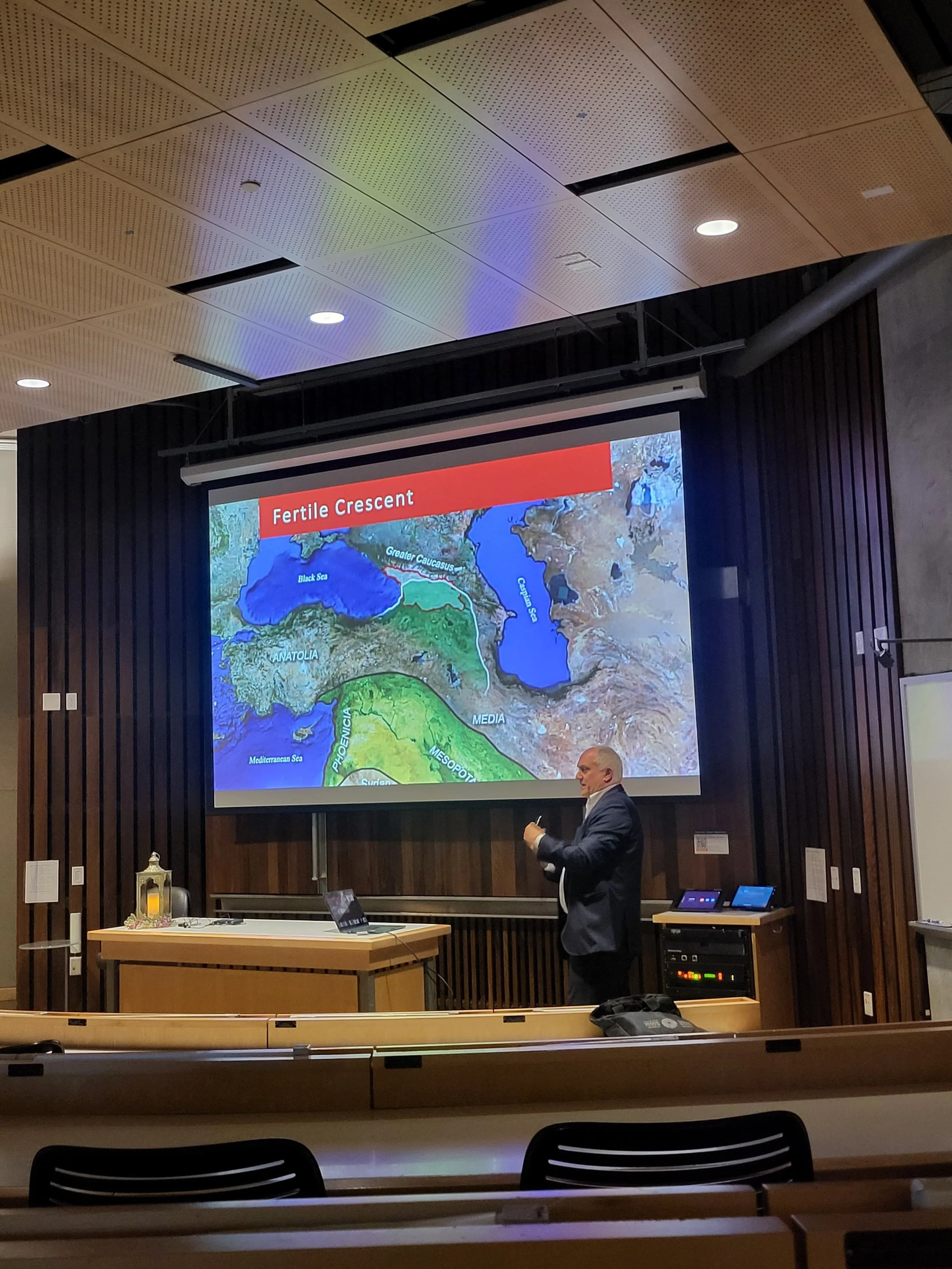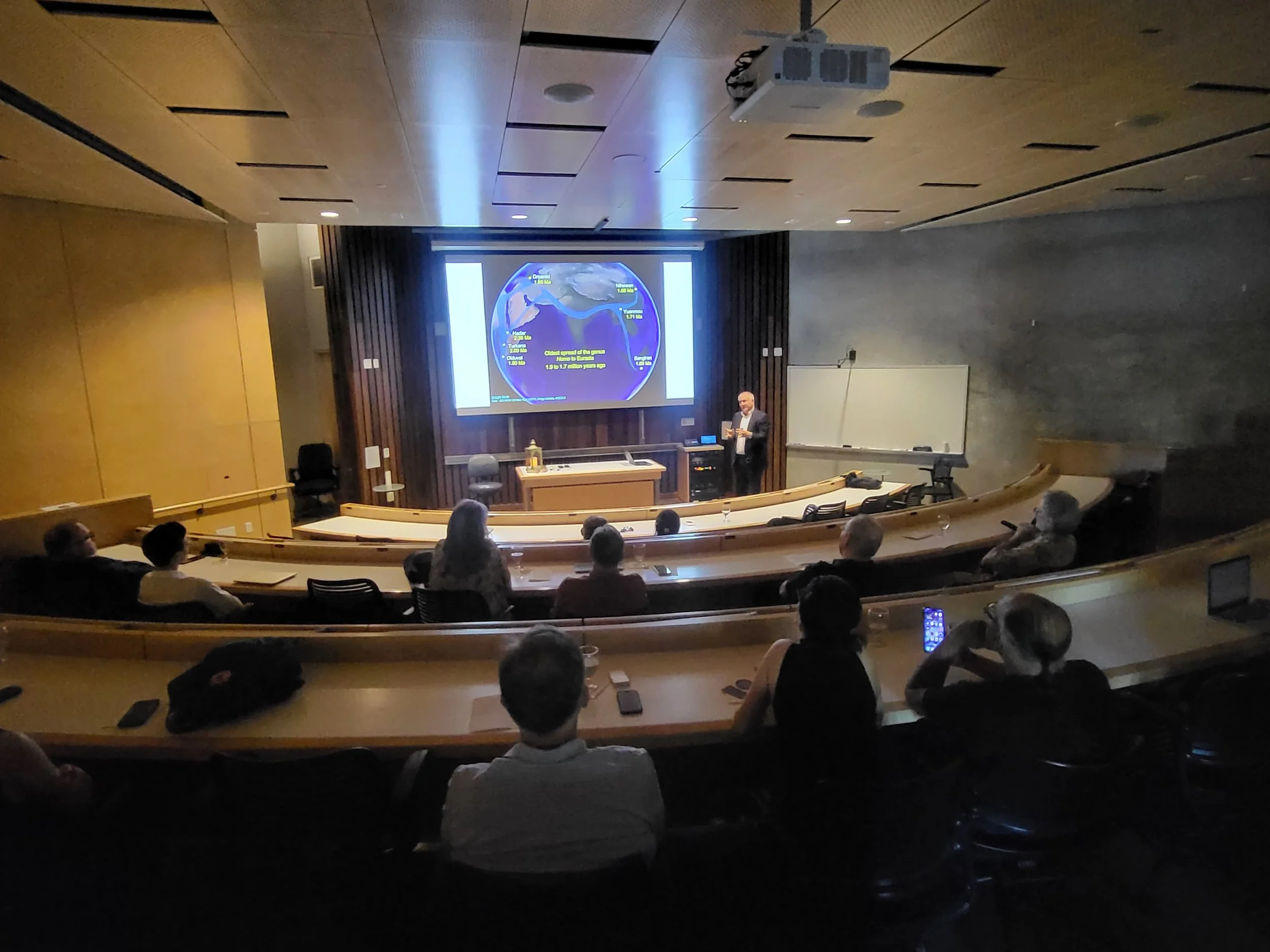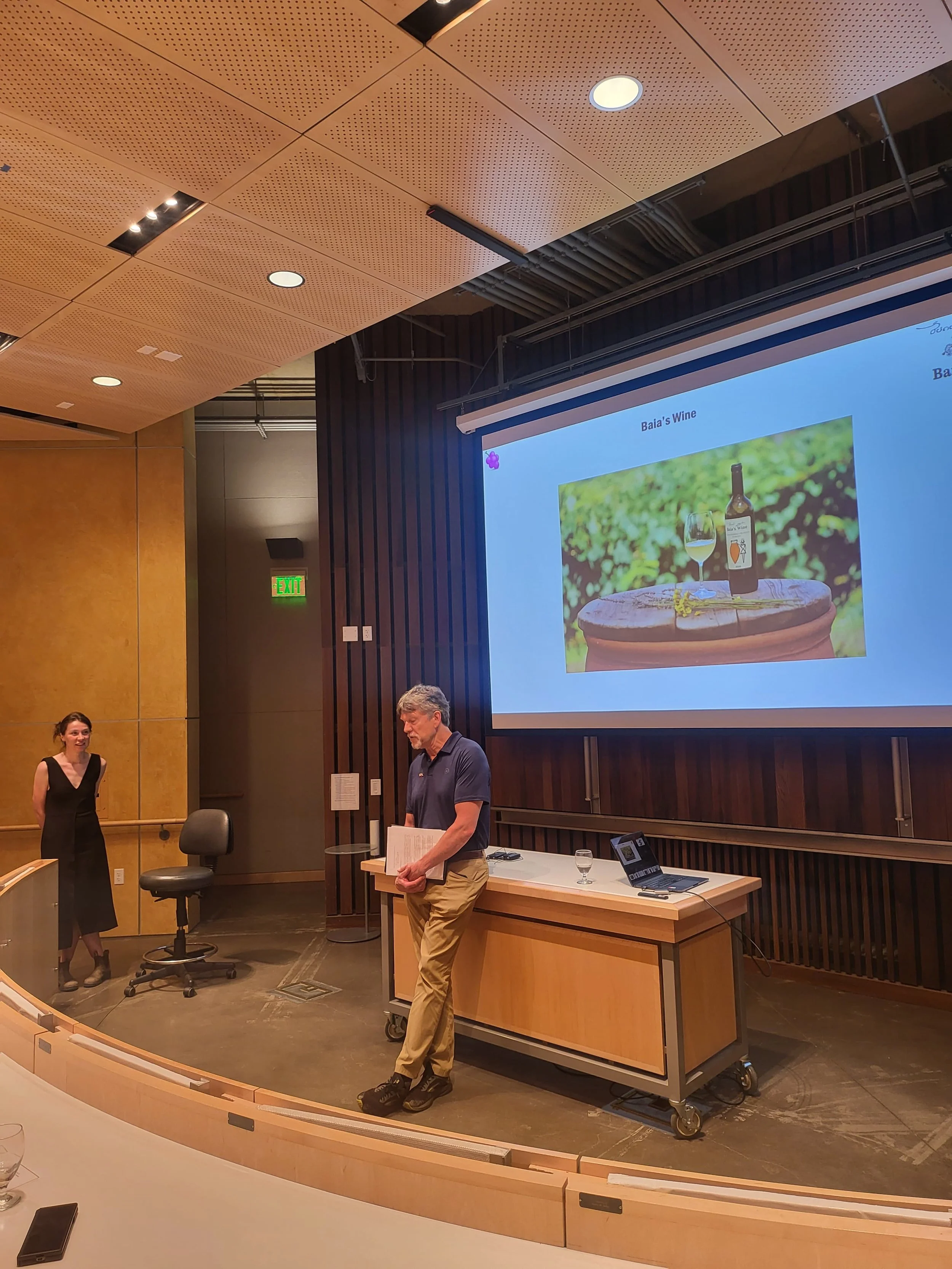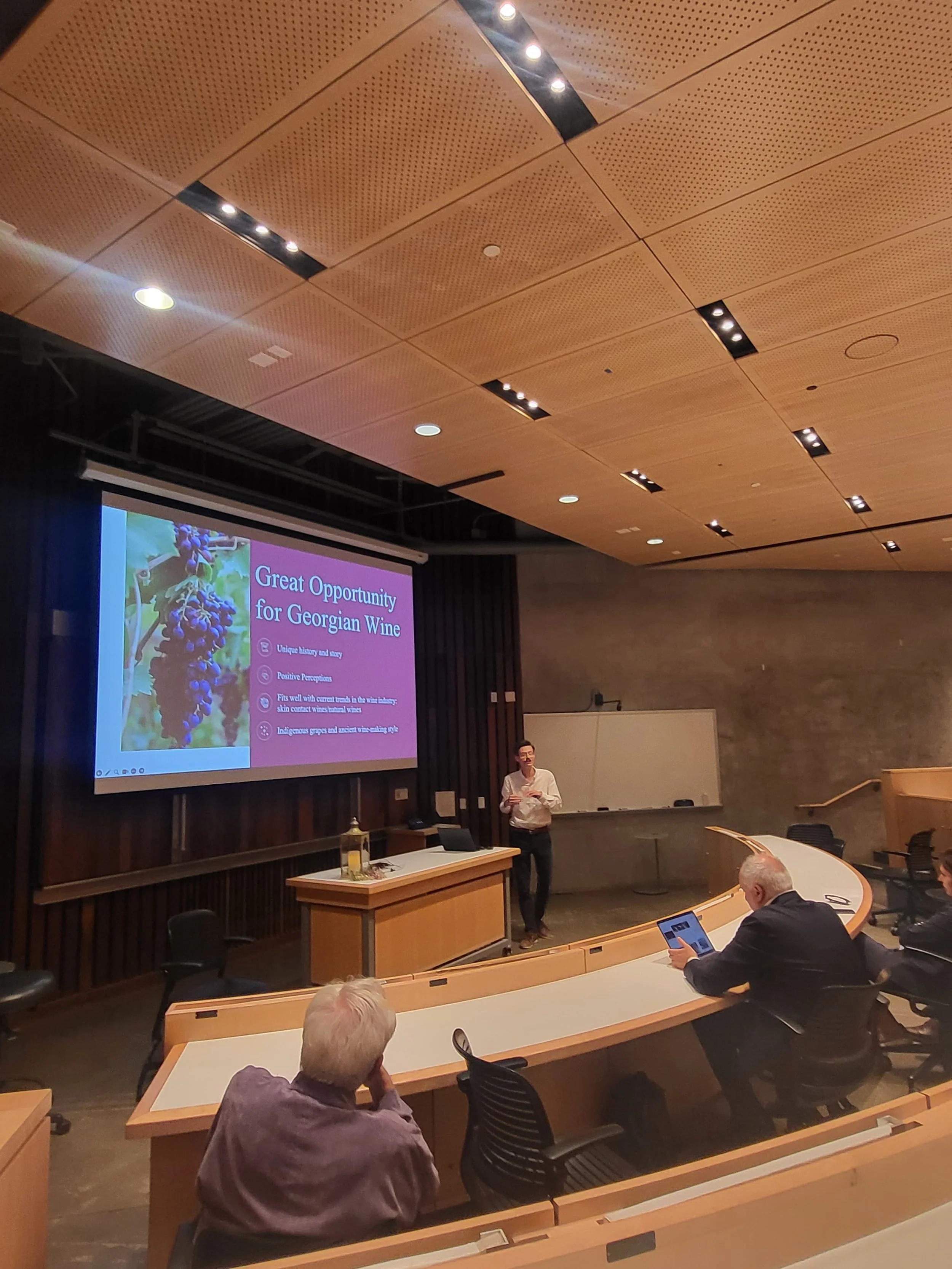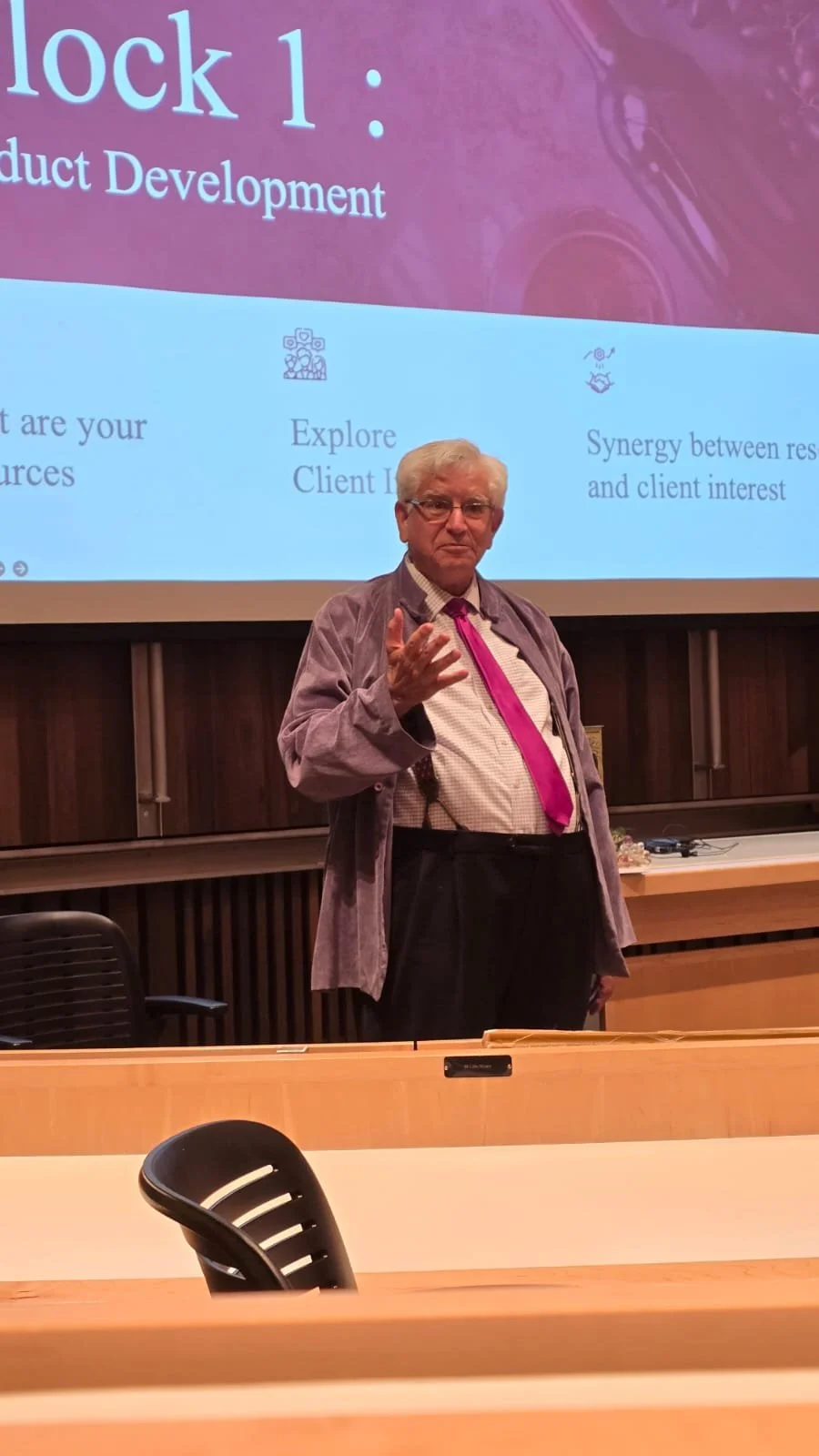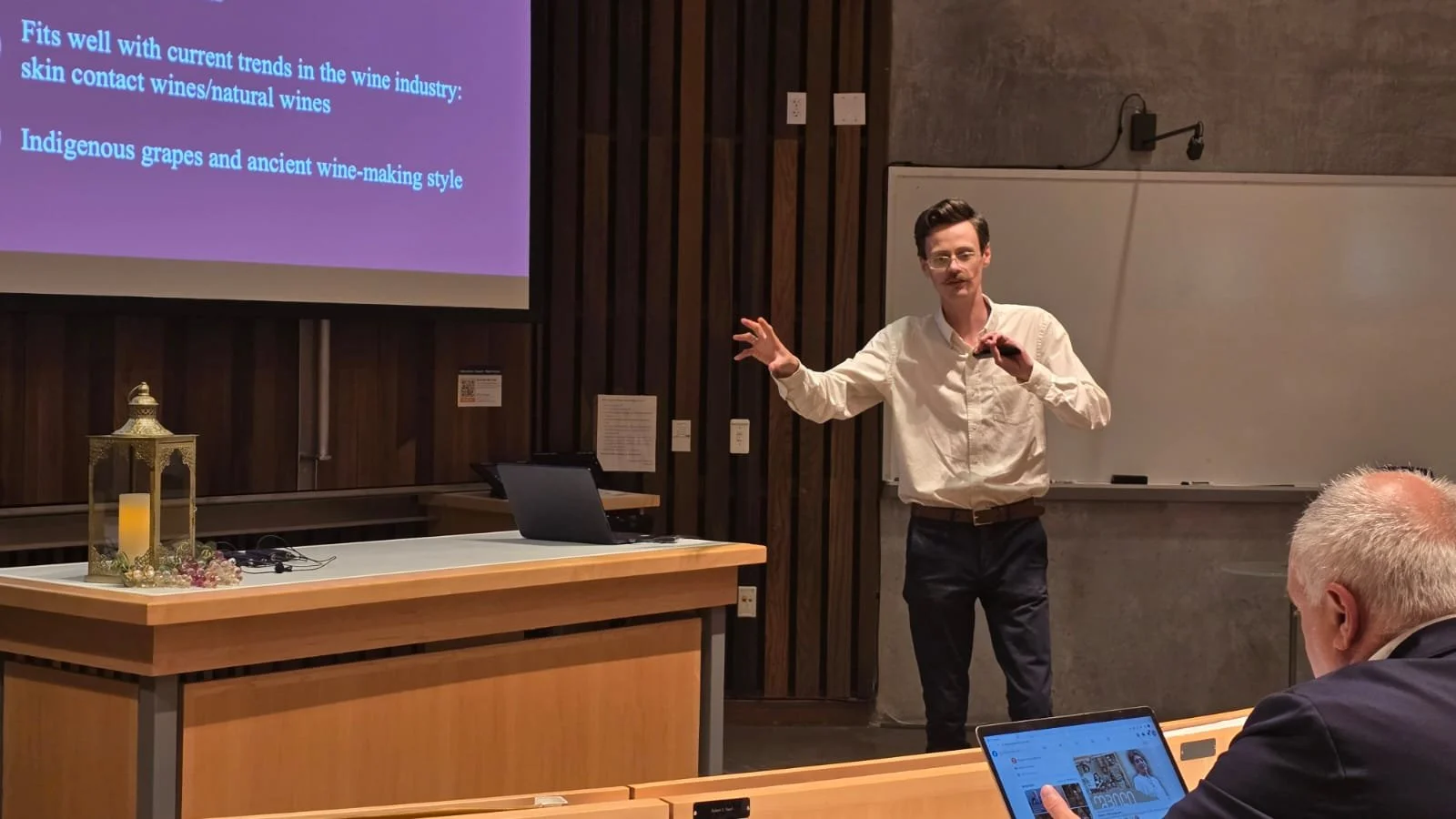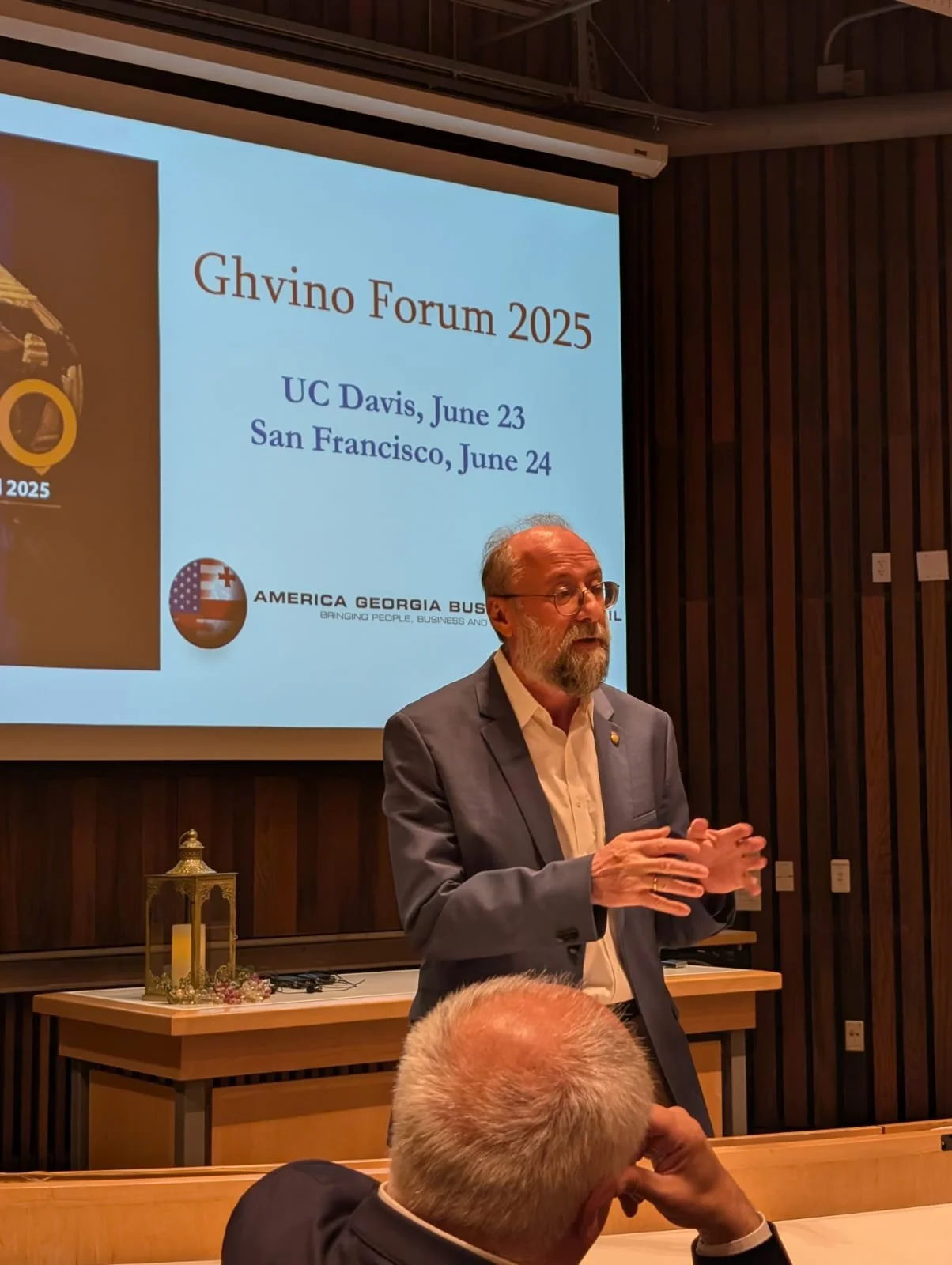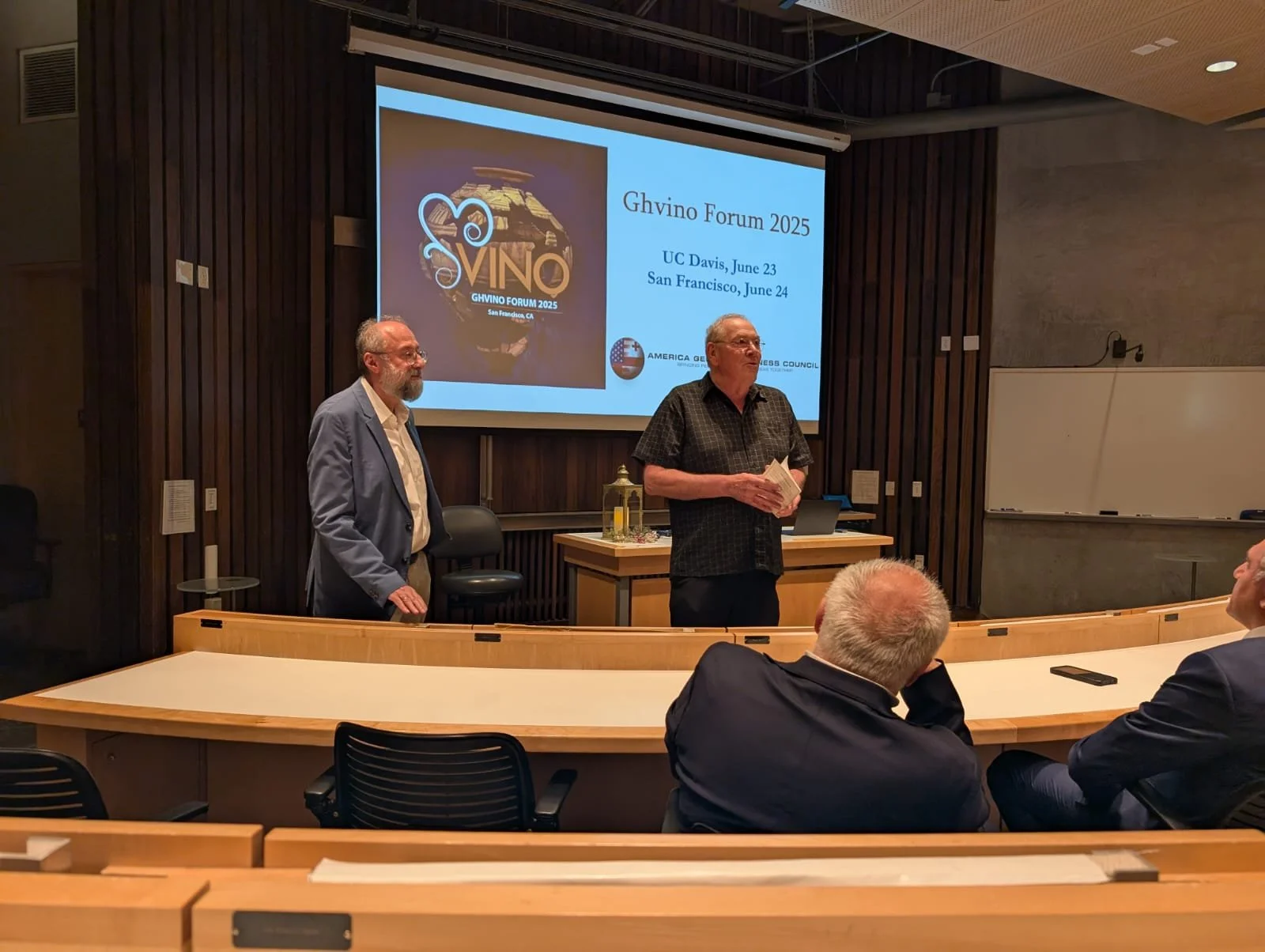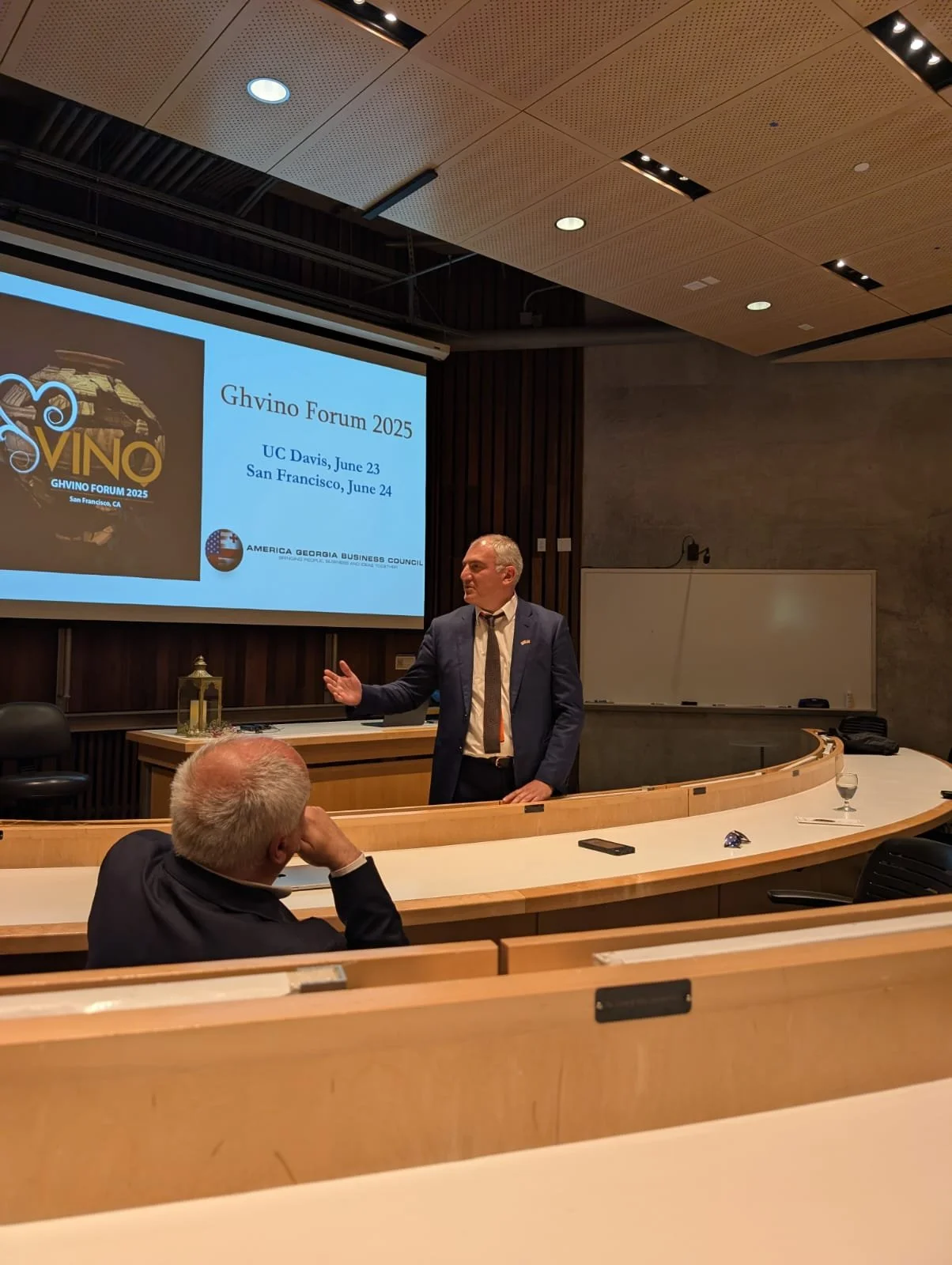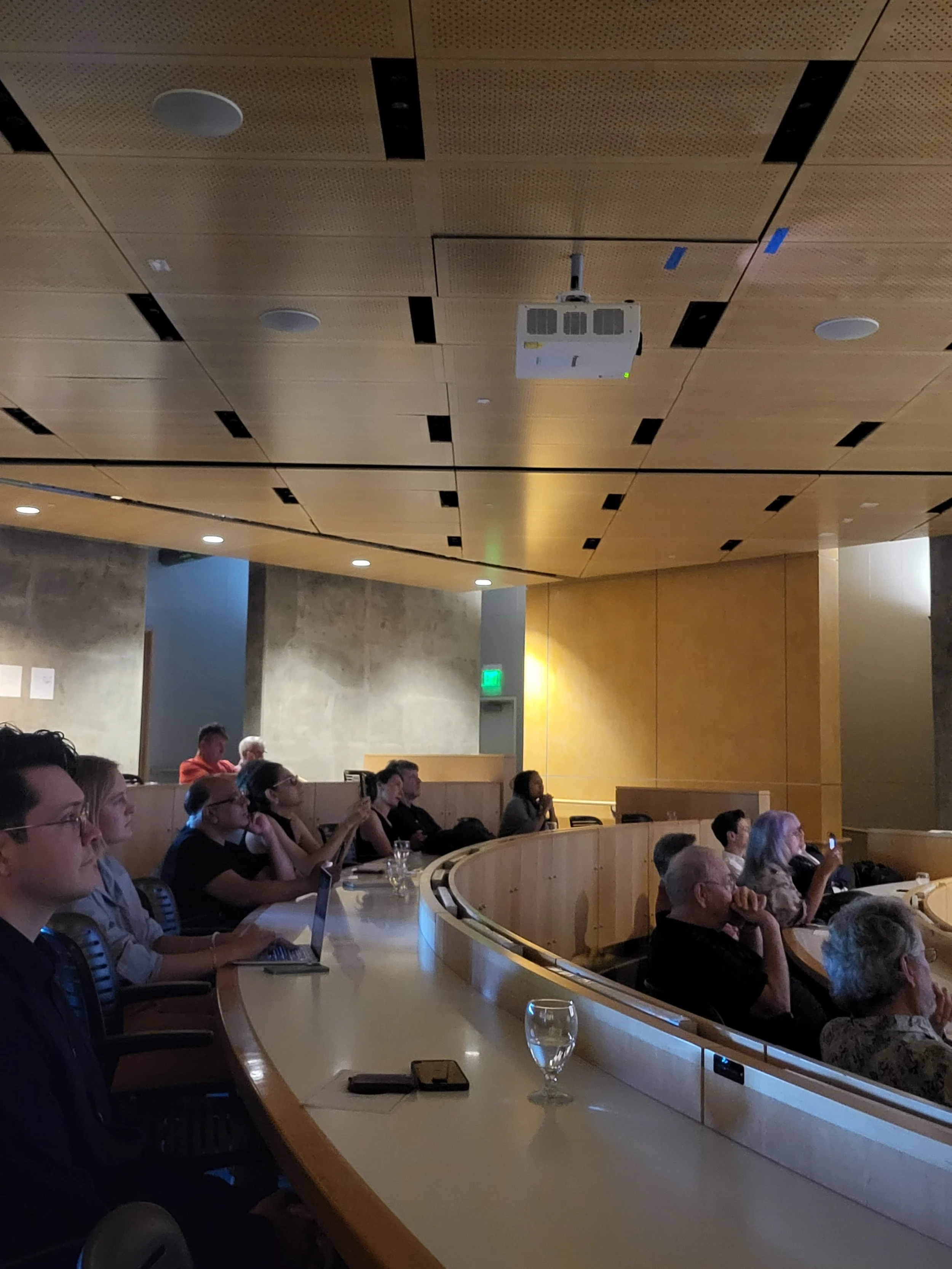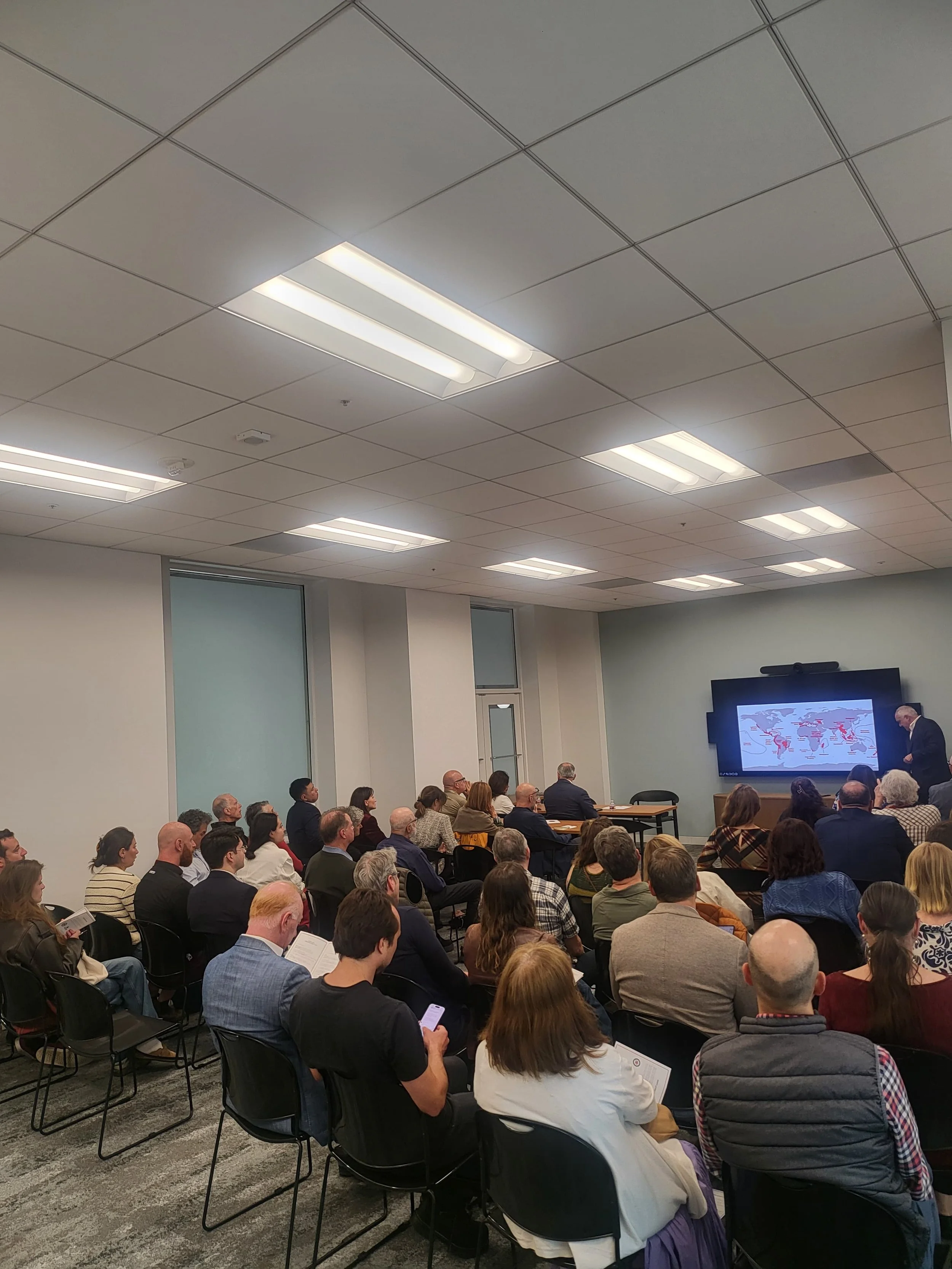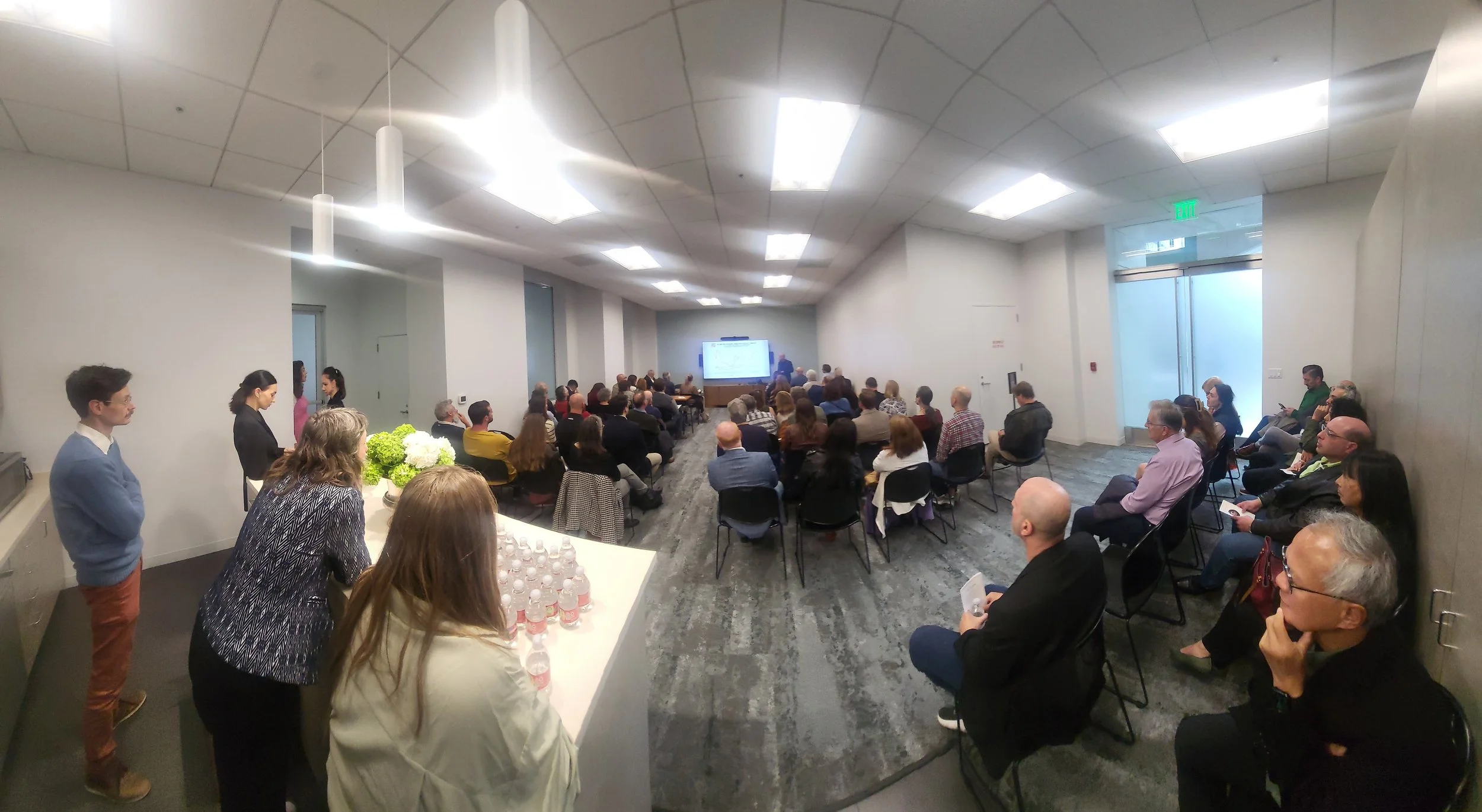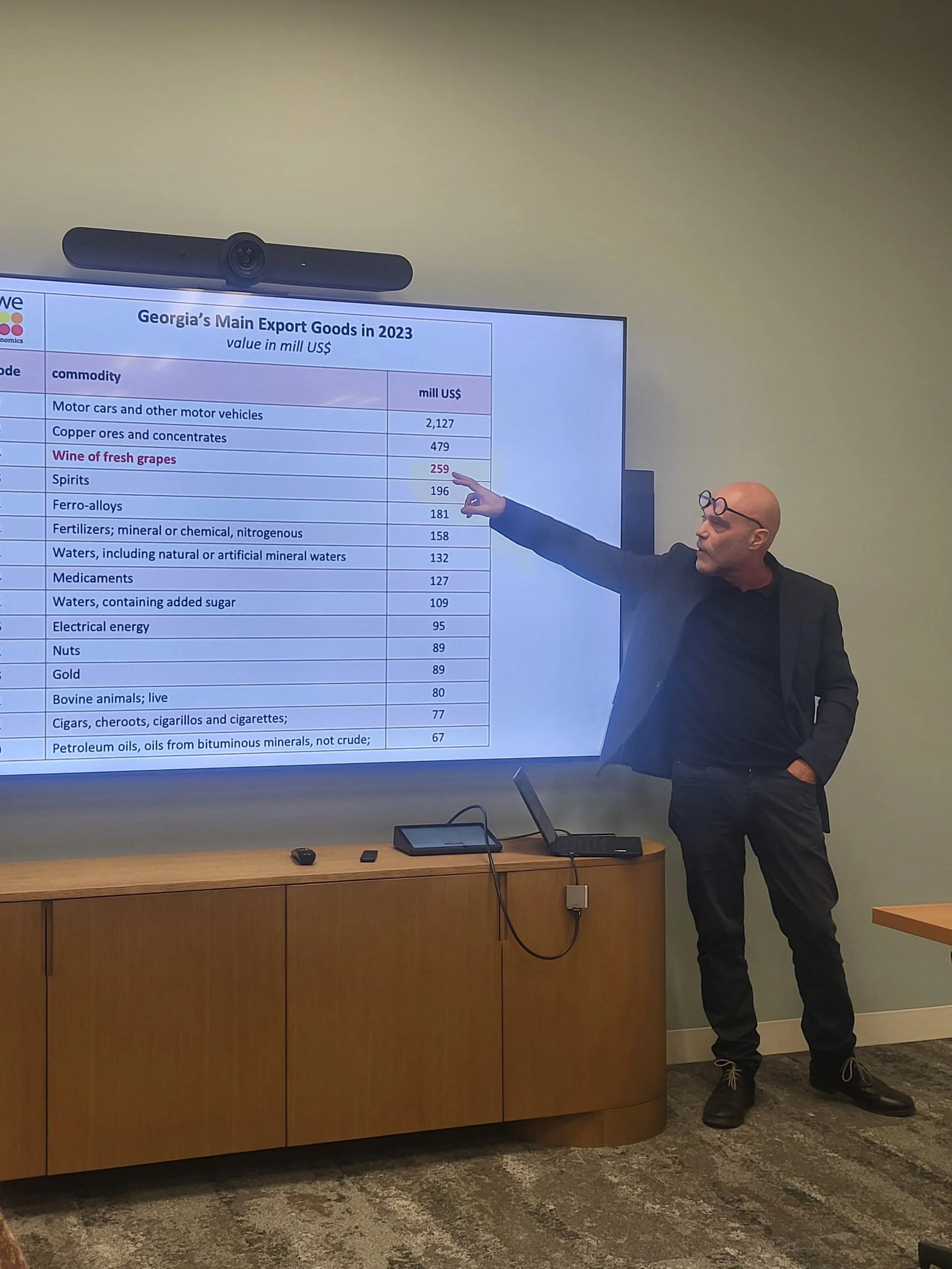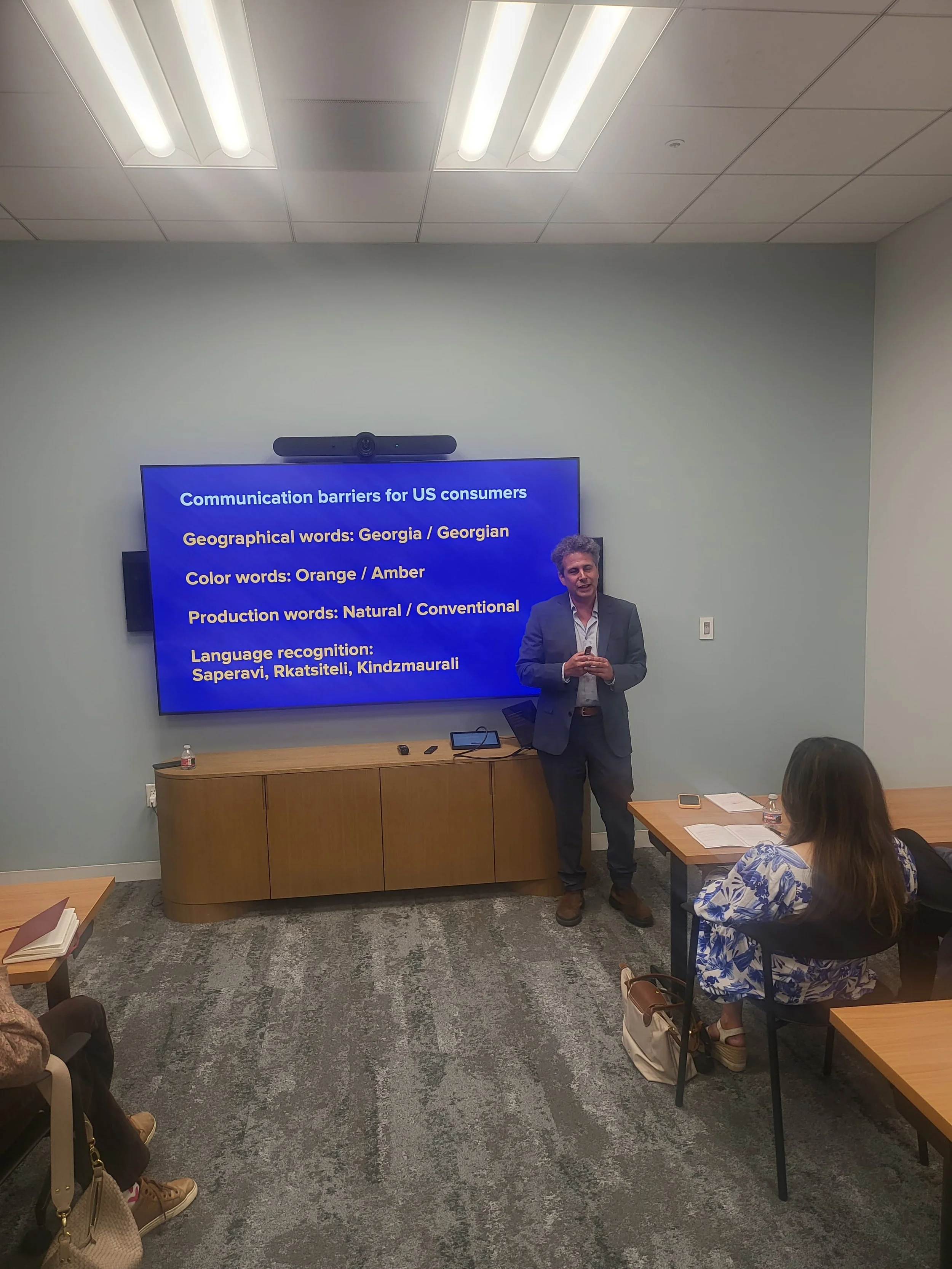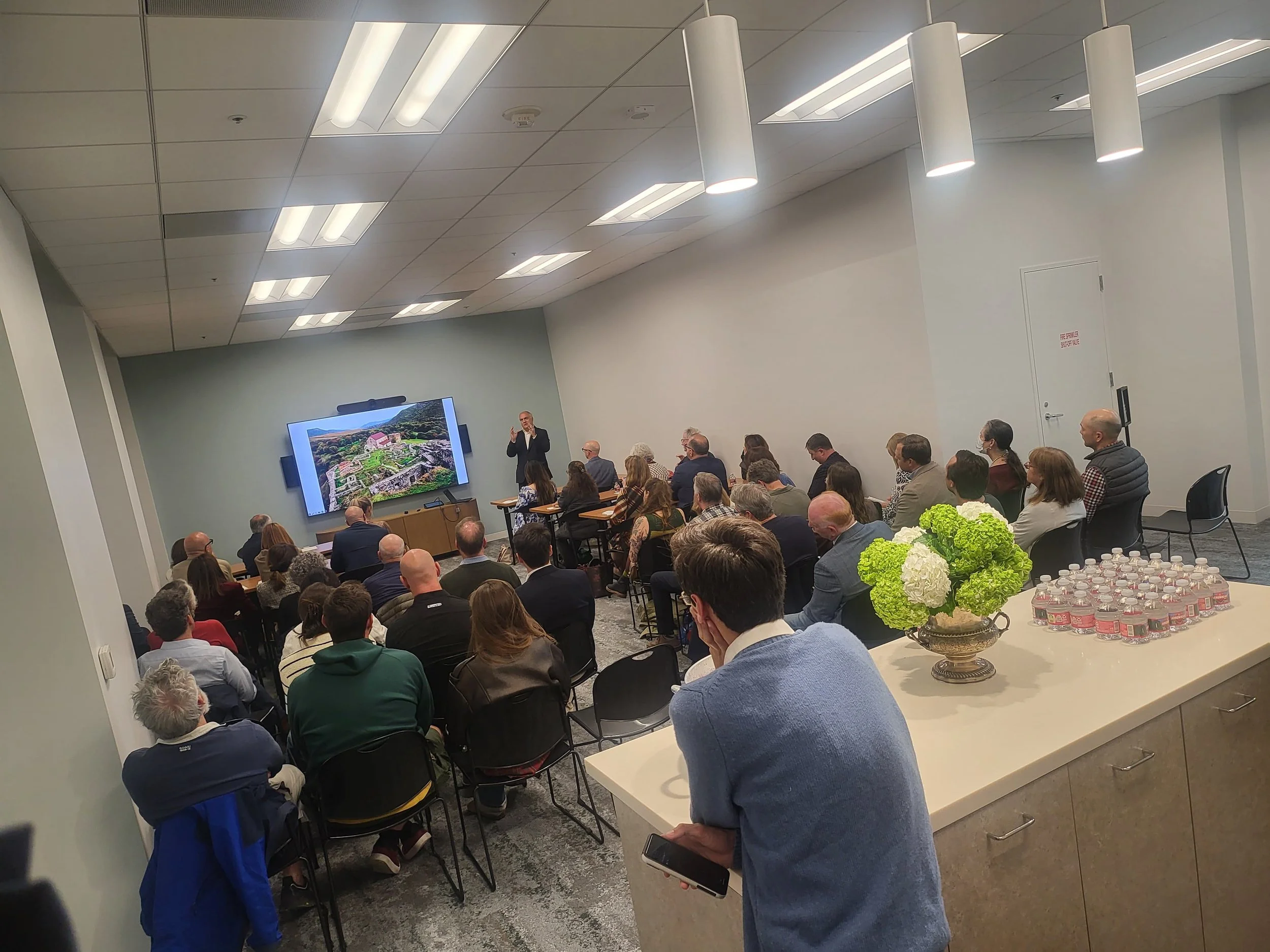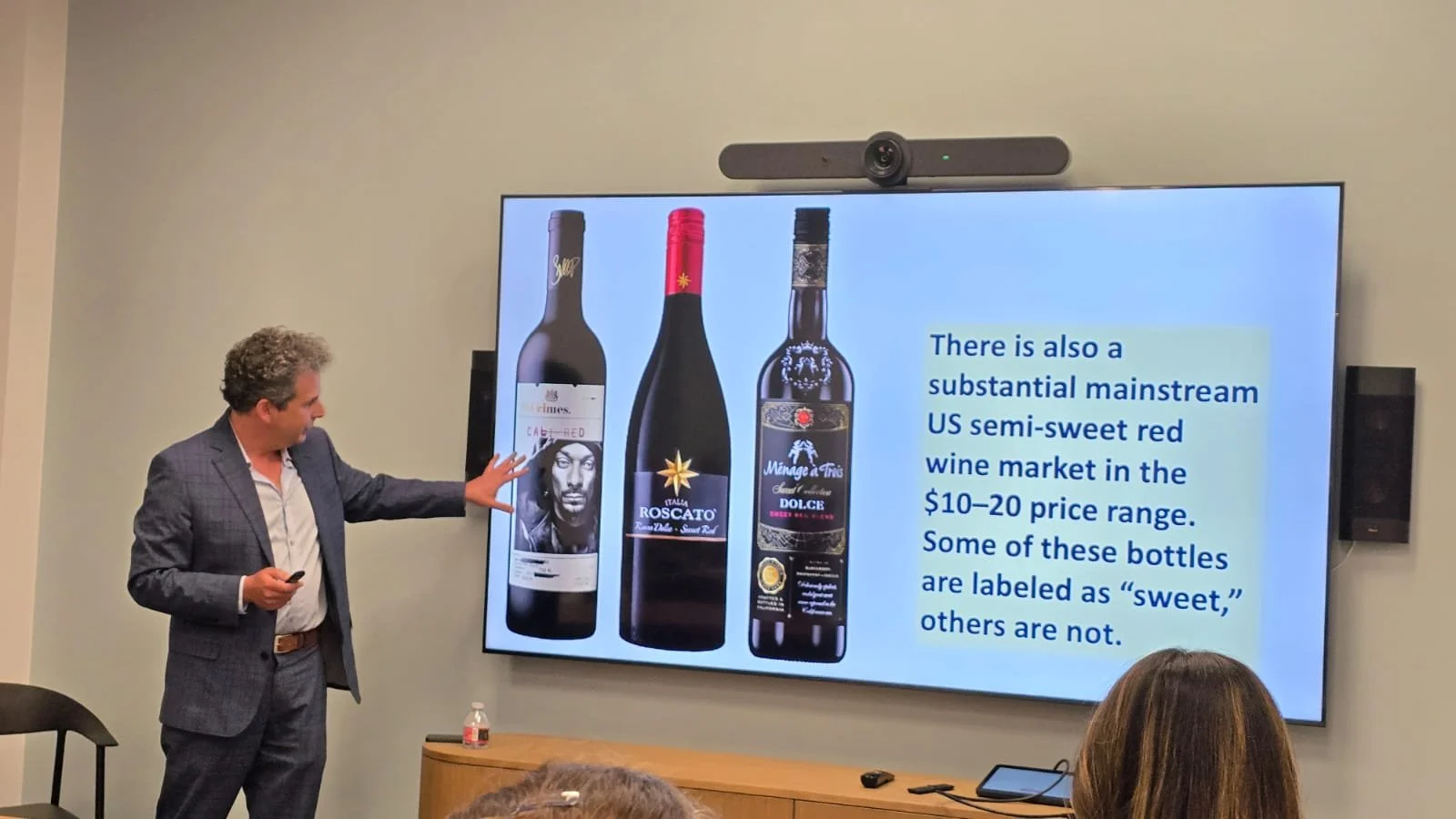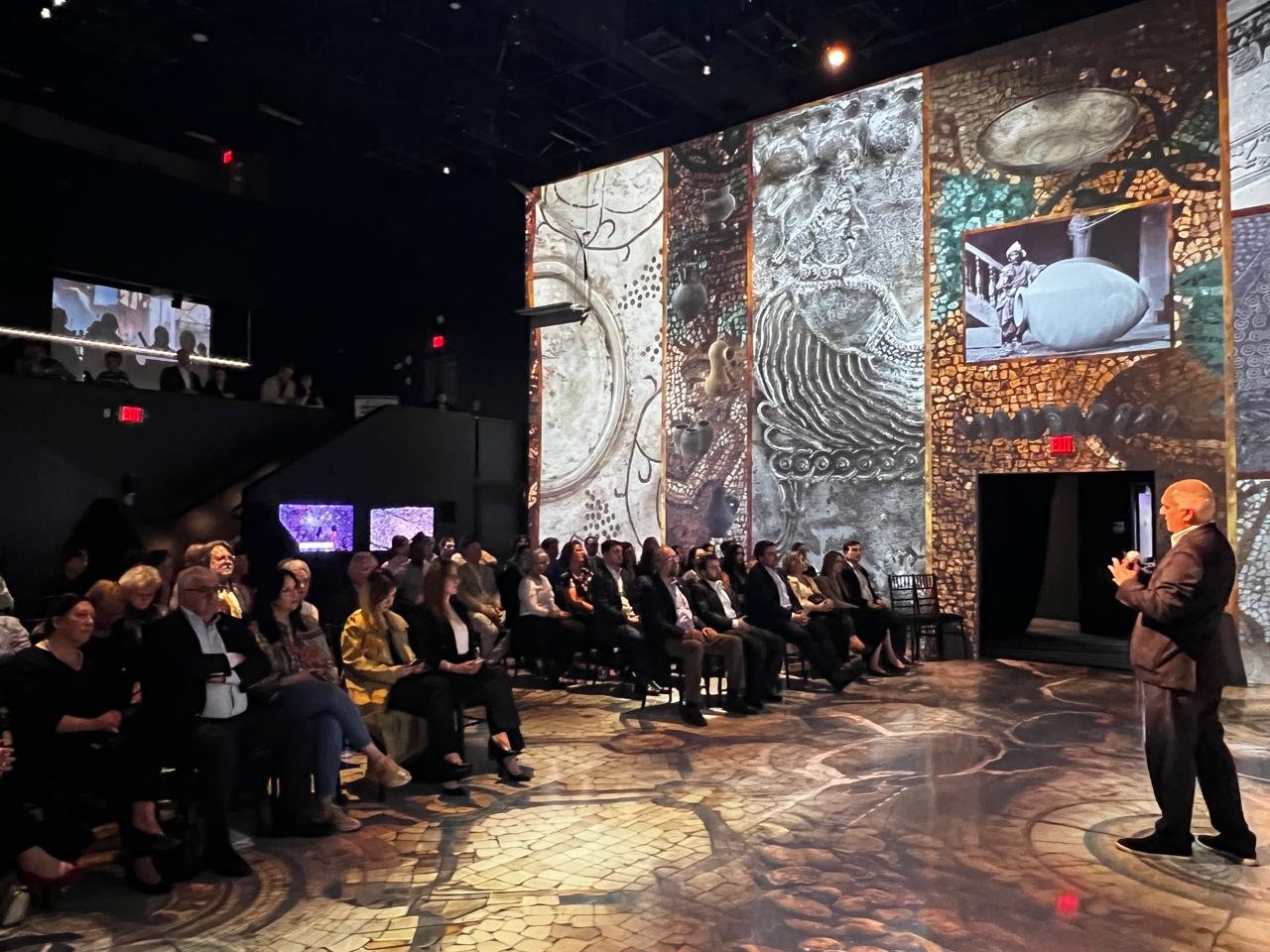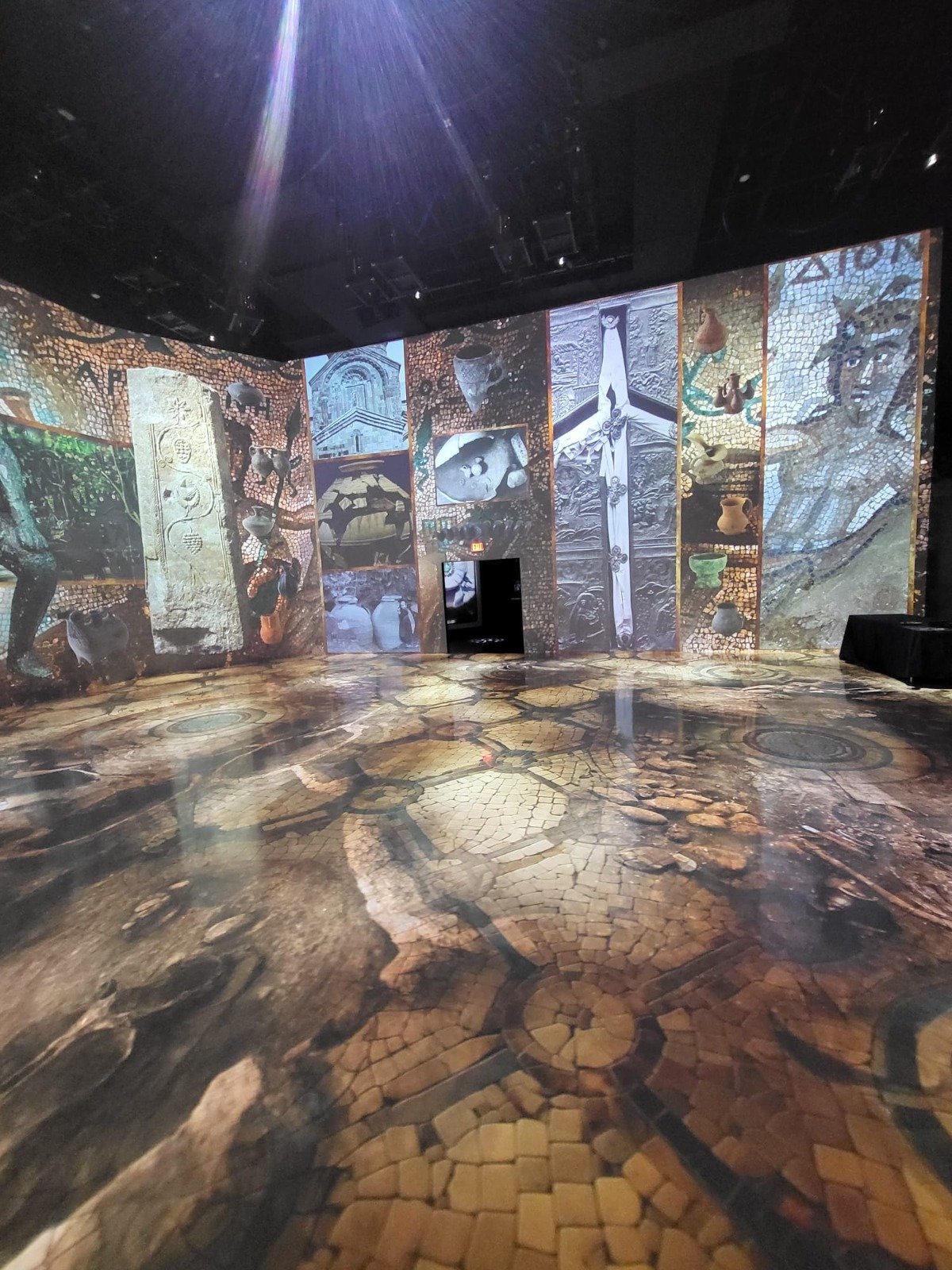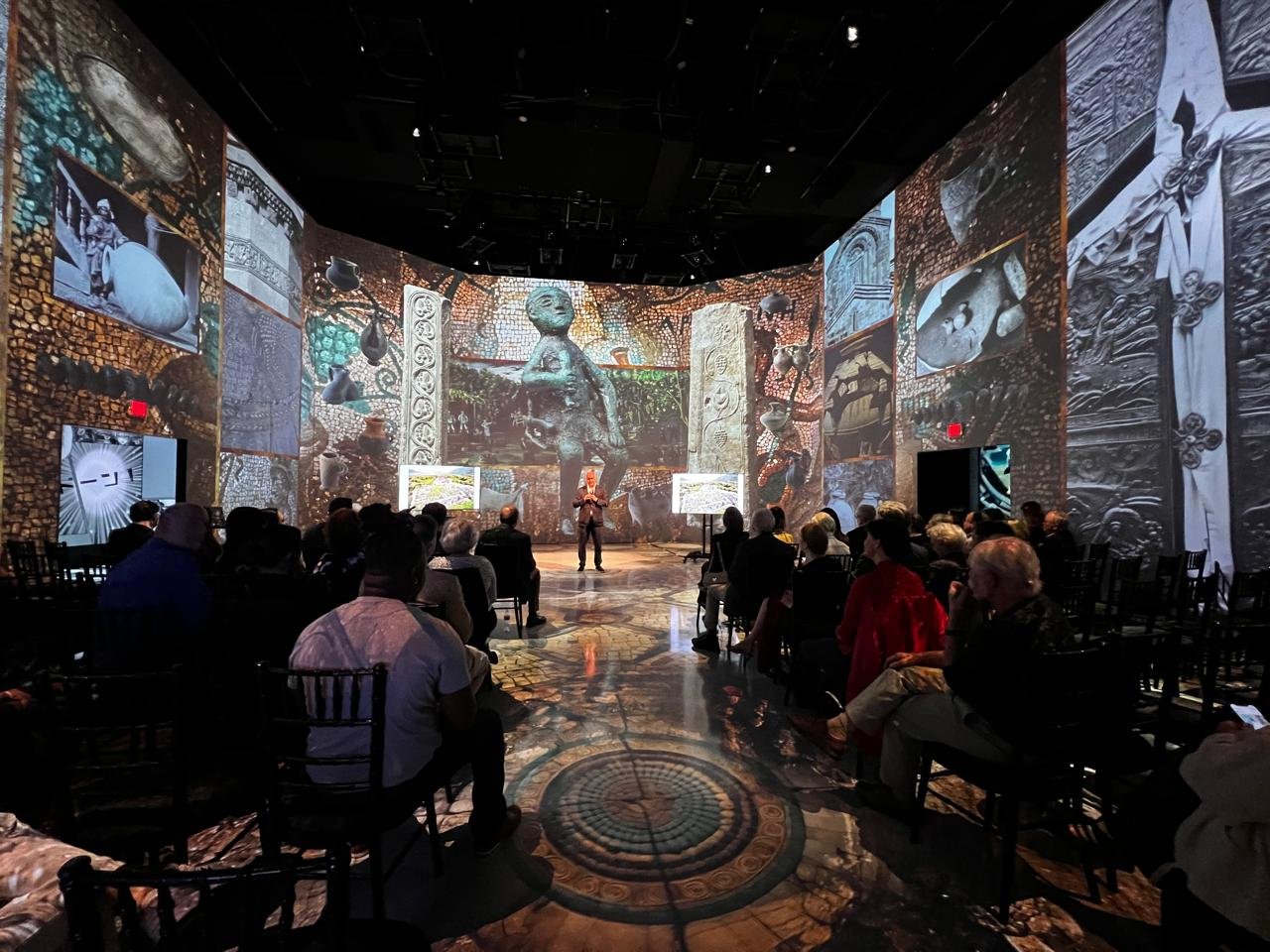
ABOUT ღVINO* FORUM
Ghvino Forum is a celebration of 8000 years of living wine culture in Georgia, where the origins of wine, uninterrupted Qvevri wine-making tradition and unique varietal distinctiveness evolved into the elegance of modern-day winemaking.
The Ghvino Forum was initiated in 2018 by the America Georgia Business Council to advance the understanding of the origin of vine and wine culture, and to explore the intersection of wine, society, and business in Georgia and beyond.
*Ghvino, ღvino or ღვინო is the Georgian word for “wine,” and is widely thought to be the origin of the term.
“GHVINO”
Is the Georgian word for wine and is widely thought to be the origin of the word “Wine”.

VIDEO ABOUT FORUM & WINES
Georgia Cradle of Wine

8th ANNUAL
GHVINO
FORUM
OF
AMERICA
Schedule of Events: JUNE 23-24, 2025
june 23
Discussion issues:
Developmental Impact of the Wine industry in Georgia
Marketing of Georgian Wines in the US
Time: 3:00 pm - 6:00 pm
AGENDA JUNE 23
Robert Mondavi Institute, UC Davis
3:00 - 3:10 pm
Welcome by:
Julian Alston, Distinguished Professor Emeritus, UC Davis
Levan Kulijanishvili, Consul General of Georgia in San Francisco
Mamuka Tsereteli, President, America-Georgia Business Council
3:10 PM – 3:25 PM
Opening Presentation:
Wine Story of Georgia as a Source of Competitiveness
Presented by Professor David Lordkipanidze, Head of the National Museum of Georgia
3:25 PM – 4:30 PM
Discussion: Developmental Impact of Wine Industry in Georgia
Remarks by:
• Chris Schlueter, Co-Founder/Owner, Ghvinos Wine Group, LLC
• Gvantsa Abuladze, Co-Founder, Grapegrower and Winemaker, Baia's Wines
4:30 PM – 4:45 PM
Coffee Break
4:45 PM – 6:00 PM
Discussion: Marketing of Georgian Wines in the US
Remarks by:
• Darrel Corti, Grocer, Corti Brothers
• Noel Brockett, President, Georgian House of Greater Washington, LLC
ADDRESS: Rober Mondavi Institute, UC Davis,CA
392 Old Davis Rd, Davis, CA 95616
Venue & Parking:
This event will be in the Silverado Vineyards Sensory Theater at the Robert Mondavi Institute, Sensory Building. Parking is available at the Gateway Parking Structure. Parking payment is enforced on weekdays. There are three options for parking payment:
UC Davis uses AggiePark via the AMP app – please be sure to download the app ahead of time and set up your profile. Select the zone which you parked using the map or icon in the top right corner of the app. This is the preferred and easiest method.
If you do not have a smartphone to download the app, you can also sign up for an account online and follow the steps on the website: https://aimsmobilepay.com/
Alternatively, permit machines in the Gateway Parking Structure accept credit cards for hourly parking. The cost is $3 per hour, and you will need to enter your license plate number into the machine (COSMO) to purchase a permit. Machines are located on the east side of the parking structure, at street level between the Manetti Shrem Museum and the Mondavi Arts Center.
june 24
Discussion issues:
Cultural Heritage of Georgia as a source of Competitiveness
Economics of Georgian Wine
TRACEABILITY of Wines
Time: 2:30 pm - 7:30 pm
AGENDA JUNE 24
2:30 - 3:00 pm Registration and Welcome
3:00-3:05
Opening Remarks by:
Levan Kulijanishvili, Consul General of Georgia in San Francisco
Mamuka Tsereteli, President, America-Georgia Business Council
3:05 - 3:25 Keynote Address:
Cultural Heritage of Georgia as a source of Competitiveness: Case of Wine
Presented by Professor David Lordkipanidze, Head of the National Museum of Georgia
3:25 - 3:35 Presentation: Origins of Wine Economics
Presented by Orley C. Ashenfelter, Professor, Princeton University/President, American
Association of Wine Economists
3:35 - 3:50 Presentation: Economics of Georgian Wine
Presented by Karl Storchmann, Professor, NYU/Vice President, American Association
of Wine Economists/Managing Editor, Journal of Wine Economics
3:50 - 4:00 Presentation: Traceability of Wines
Presented by John Valdez, Co-Founder, Agrow Labs
4:00 - 4:10 Presentation: Marketing Tools for Promotion of Georgian Wines in the US
Presented by Robin Goldstein, Deputy Director, Robert Mondavi Institute Center for
Wine Economics, UC Davis
4:10 - 4:25 Discussion
4:25 - 4:30 Introduction of Baia's Winery
by Gvantsa Abuladze, Co-Founder, Grapegrower and Winemaker
4:30 - 7:30 Public tasting and food and wine pairing
! Guests must be at least 21 years old to attend the wine tasting!
The event is supported by the National Wine Agency of Georgia
About the Ghvino Forum:
Ghvino Forum is a celebration of 8000 years of living wine culture in Georgia, where the origins of wine, uninterrupted Qvevri wine-making tradition and unique varietal distinctiveness evolved into the elegance of modern-day winemaking. The Ghvino Forum was initiated in 2018 by the America Georgia Business Council to advance the understanding of the origin of vine and wine culture, and to explore the intersection of wine, society, and business in Georgia and beyond.
About the America-Georgia Business Council:
The America-Georgia Business Council (AGBC) is a non-profit business association established in 1998. Based in Washington, D.C., the AGBC encourages activities and policies that promote strong economic ties between the United States and Georgia. AGBC’s membership includes both large and medium-sized U.S. companies operating in Georgia and the surrounding region, as well as Georgian business entities that are beneficiaries of significant U.S. capital, management, and expertise. These members innovate, create jobs, and support communities in both the United States and Georgia.
“Wine is, and always has been, our identity.”

GEORGIA: THE ORIGIN OF WINE
ARCHAEOLOGICAL EVIDENCE
In November 2017, the National Academy of Sciences released a report, Early Neolithic Wine of Georgia in the South Caucasus. Authored by Patrick McGovern and other prominent scientists, this report documents the research project conducted by an international team of scientists which confirmed the beginnings of viticulture and winemaking can be traced to around 6000 B.C., in Georgia.
Image courtesy of: Early Neolithic Wine of Georgia in the South Caucasus
Previous evidence suggested that the earliest signs of winemaking dated to around 5400 – 5000 B.C. in Iran, but this latest project re-examined sites in Georgia at Shulaveris Gora and Gadachrili Gora, 50km south of Tbilisi, using new techniques, and found wine residues from the interiors of eight large jars from the early Neolithic sites. The project was undertaken by scientists from the US, Canada, Denmark, France, Italy, Israel and Georgia and fully funded by the Government of Georgia.
Using the most up-to-date technology, the team was able to establish the fingerprint compound for grape and wine (tartaric acid) and three associated organic acids (malic, succinic and citric), demonstrating that the Eurasian grapevine (Vitis vinifera) was present in what is now Georgia, in early Neolithic times, and growing in ideal conditions. The team also found that the quantity of wine the jars could hold – upwards of 300 liters each – suggests that the grapevine had been domesticated and was being cloned and transported using horticultural techniques.
These results not only set the dates for the earliest production of wine, but perhaps most significantly, just how important wine was in the social setting of the earliest periods of human sedentary village life and that it has remained much so to this day.“
The earliest biomolecular archaeological and archaeobotanical evidence for grape wine and viniculture from the Near East, ca. 6,000–5,800 BC during the early Neolithic Period, was obtained by applying state-of-the-art archaeological, archaeobotanical, climatic, and chemical methods to newly excavated materials from two sites in Georgia in the South Caucasus. Wine is central to civilization as we know it in the West. As a medicine, social lubricant, mind-altering substance, and highly valued commodity, wine became the focus of religious cults, pharmacopeias, cuisines, economies, and society in the ancient Near East. This wine culture subsequently spread around the globe. Viniculture illustrates human ingenuity in developing horticultural and winemaking techniques, such as domestication, propagation, selection of desirable traits, wine presses, suitable containers and closures, and so on.
Courtesy of: Early Neolithic Wine of Georgia in the South Caucasus - PNAS,114 (48)
“These results not only set the dates for the earliest production of wine, but perhaps most significantly, just how important wine was in the social setting of the earliest periods of human sedentary village life and that it has remained much so to this day.”

EVENT CONTACT
EVENT
Irine Asatiani
+ 1 202 423 1054
americageorgiabusiness@gmail.com
www.agbdc.com
AMERICA–GEORGIA BUSINESS COUNCIL (AGBC)
Established in 1998, the America–Georgia Business Council (AGBC) is a private, non-profit corporation governed by a Board of Directors. The AGBC promotes trade and investment between North America and Georgia by helping companies focus and accelerate decision-making to forge successful, bilateral business partnerships.
The AGBC relies on a deep understanding of the Georgian political and business landscape, direct access to high-level government officials and agencies, and diverse business contacts to deliver value and maximize opportunities for our members.

